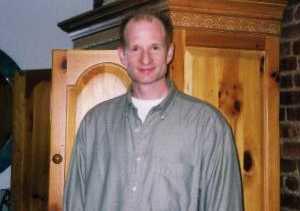
|
Rex Smith as Chauvelin SP2: Minskoff Theater |


This is the second part of my interview with Nick Corley. If you haven't already done so, you should read the first part.
In this section, Nick talked a bit of how the show went from his readings to a full-scale Broadway version, and where it's going in the future.

NR: OK now, we covered what readings are. Can you explain some more about workshops?
NC: Workshops are different. The actors are actually paid. The actors got a nominal fee to do the readings, to cover their transportation. A workshop is where they audition, you cast the show, they meet for a set amount of time and work on the show, and actually rehearse it like they were doing a real production. They're usually off book. Because you go through that process, the actors share in a percentage of the show. There's a workshop contract.
NR: Did Scarlet Pimpernel do workshops?
NC: No, there were no workshops. There were only readings and things were learned from the readings, but they aren't handed new pages every day. They're not there for four weeks rehearsing. Titanic did a workshop. They did a four to six week workshop where they helped develop the show. For Pimpernel, we just did some readings for the authors to look at the material, which is a different thing from working on the material.
NR: Now, interestingly, it went from that to previews on Broadway. There was no out of town tryout. That's a huge jump. How was that decision made?
NC: It was made on a financial basis. It's very expensive to go out of town with a new show. The Minskoff became available. Certain factors just fell into place that made that happen. Ultimately, I don't think it was a good idea for the show. Things that work great on paper may not work in a reading. Things that work great in a reading may not work great on stage. There were a lot of complicated things that needed to be answered. How do you behead people on stage? It's one thing to say with a stage direction, and have someone sit down, and the audience gasps. But, it's a different thing to have that actually happen on stage. It was a hard way to open a new musical, but unfortunately, with the economics of today, it's become the fate of many shows. Titanic opened in town without a tryout and had a hard time also in previews, making major, major changes. You only have so much time. The cast is performing at night, you can only rehearse so many hours a day. To make big changes is extremely complicated once a show is up. Some little thing can affect set changes, underscoring music. One little thing you want to change may take a whole day, to change three minutes of something, because it affects so many departments. You just can't hand pages to the actors and say, "Try this." It's a very complicated process. I know they worked really hard. Peter was terrific. The changeover was terrific. Peter Hunt was always very nice to me. He always thanked me very sincerely for all the work I had done to take the show to that point so that it could then be handed over to him to make it a real Broadway musical.
NR: Did he continue to confer with you after that?
NC: No. Nan invited me to the Opening Night and I saw him after the show. We gave each other a big hug. I was very happy for him to get that big of a show up in town. That's an extremely difficult thing and he deserves a lot of credit for getting that accomplished.
NR: How different was what you saw Opening Night from your readings?
NC: Different. The show started differently. Eventually, what's interesting is that when they cut down the opening during the run, it went back closer to the reading.
NR: You're talking about the original prison scene when they first opened in November, `97?
NC: Right. That was never there. It's hard for me to say. They were just different ideas.
NR: SP1 was much funnier and campier than SP2. Where did your version fit in with that?
NC: I think the show was tighter in the reading.
NR: Then they went back to that.
NC: Yeah. All in all the show was tighter and I think the story was told in a really compact, economical way in the reading.
NR: That's interesting because that's what you hear now about the second version and it was a criticism against the first that they didn't do that.
NC: Yeah. I also think the show was about slightly different things in the reading. I think the relationship between the three main people was tighter in the reading.
NR: Similar to the way it is now?
NC: No, totally different. Bobby's (Longbottom) done a lot of good things to heighten that triangle. I think that triangle was there in the beginning. I think you got a nice mix of the comedy and the swashbuckling and the fops. In putting it up in a huge theater, I think the show got stretched in a way that was maybe not best for the show, that needed to be tightened.
NR: Which is what's going to happen now in the Neil Simon.
NC: Yes.
Website Copyright Policy